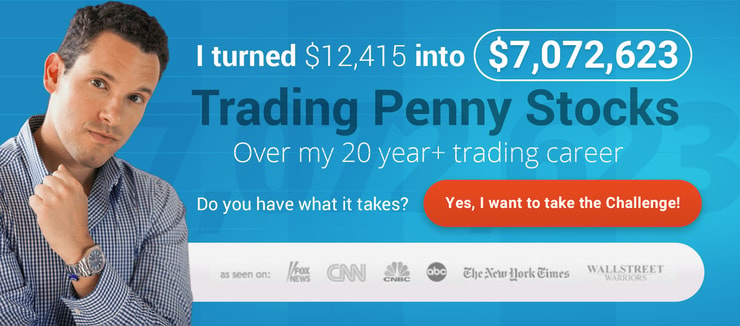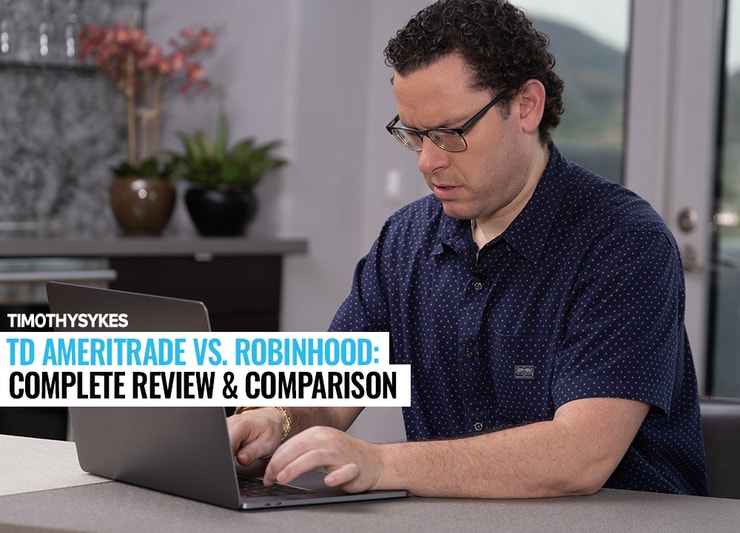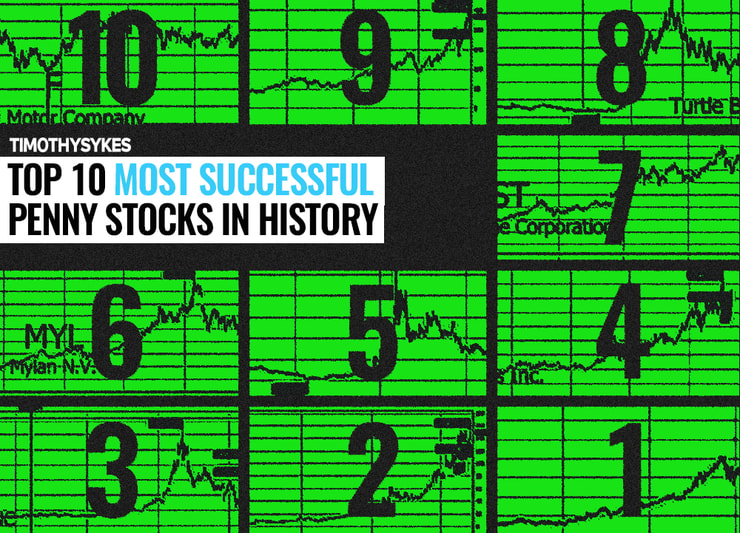At least once a week, a student DMs or e-mails me: “Hey Tim, please compare TD Ameritrade vs. Robinhood.”
These are two brokerage platforms my trading students ask me about often … I think that’s interesting since they’re very different.
They each have their pros and cons.
I’m familiar enough with Robinhood’s platform, although I don’t care for it personally (more on that later).
TD Ameritrade has a ton of features and lets you trade pretty much anything … but also charges fees.

Robinhood, on the other hand, is free and known as user-friendly. But there’s more to get into there too.
Pay close attention: I’ll share everything I’ve learned about both platforms. And I’ll include some tips usually reserved for my Trading Challenge students.
What can I say? I love to teach … and today I’m feeling especially generous. Let’s do this.
Table of Contents
- 1 TD Ameritrade vs. Robinhood: How to Decide
- 2 TD Ameritrade vs. Robinhood: Costs
- 3 TD Ameritrade vs. Robinhood: Account Minimums
- 4 TD Ameritrade vs. Robinhood: Trading Platforms
- 5 TD Ameritrade vs. Robinhood: Research Quality and Tools
- 6 TD Ameritrade vs. Robinhood: Types of Account
- 7 TD Ameritrade vs. Robinhood: Trade Experience
- 8 TD Ameritrade vs. Robinhood: Customer Service
- 9 TD Ameritrade vs. Robinhood: Range of Offerings
- 10 FAQ on TD Ameritrade vs. Robinhood
- 11 Conclusion: TD Ameritrade or Robinhood?
TD Ameritrade vs. Robinhood: How to Decide

2025 Millionaire Media, LLCSo why use TD Ameritrade vs. Robinhood? Or Robinhood vs. TD Ameritrade?
Perhaps you’ve seen other traders using Fidelity, Charles Schwab, E-Trade, or Webull … Should you use one of those instead?
While I can’t choose your platform for you, I can tell you that picking a brokerage is like buying a car…
You might be looking for the fastest or sleekest car. Meanwhile, your friend might want the safest or most affordable car.
Trading platforms work the same way.
Some brokerages are popular because they’re cheaper or easier to use. They tend to attract newbies and casual traders.
Others cater to a more professional customer base. They boast fast execution times, good customer service, and fancy charting software … but they usually cost something.
So when it comes to TD Ameritrade vs. Robinhood, I can’t decide which is better for you. But I can explain some of the differences.
A big one is commissions and fees…
TD Ameritrade vs. Robinhood: Costs
Let’s look at what every trader wants to know: what are the fees for these brokers?
TD Ameritrade Fees
TD Ameritrade has no fees to trade U.S. stocks or ETFs.
But maybe you’ve been on Reddit recently and feel inspired to dabble in options trading … TD Ameritrade will charge you 65 cents per contract.
That might not sound like a lot of money, but if you trade options frequently, those fees add up FAST!
Here’s a little tip I usually only tell my Trading Challenge students…
If you trade more than 10 times a month, call TD Ameritrade customer service … Explain that you want reduced fees, and they could drop your commission to 45 cents per contract.
Robinhood Fees
Now you’re probably wondering … what about Robinhood’s fees?
Zero, zilch, nada.
A lot of brokerages advertise “zero fees” — which they keep their word on until you trade anything outside of the U.S., penny stocks, or options (aka, the juicy stuff).
Robinhood has no fees for stocks and options … but they don’t offer access to OTC stocks.
For a sector that’s been HOT this year, I think that’s a big oversight. OTCs are my favorite stocks to trade, which is one reason why I don’t use Robinhood.
But you can buy thousands of options contracts with zero commissions. That’s one reason why newbie traders like Robinhood.
It allows a lot of people to dip their toes into the stock market without breaking the bank. In theory, anyway.
TD Ameritrade vs. Robinhood: Account Minimums
Neither TD Ameritrade nor Robinhood has account minimums.
You can start an account and leave zero dollars in it for as long as you want…
But even if your account is small, don’t be afraid to start trading!
I started with only $12,415 and turned it into $7.1 million.* And I did it all using the 7-step framework I lay out in my “Pennystocking Framework” DVD. My students and I still use this same framework.
New to penny stocks? Start here with my FREE online guide!
TD Ameritrade vs. Robinhood: Trading Platforms
Let’s check out the differences between these platforms…
More Breaking News
- VSEE Stocks Plunge: Buying Opportunity?
- How Trump’s Tariffs Will Affect NVIDIA: Stock Market Perspective
- Thomson Reuters Benefits from Strategic Moves and Positive Market Sentiment
TD Ameritrade Platform
What about the features on the platforms for TD Ameritrade vs. Robinhood? To me, TD Ameritrade wins by a long shot.
That’s because TD Ameritrade has powerful desktop software called thinkorswim. It’s no cost with zero fees. And there’s no account minimum required to use it.
If you have a TD Ameritrade account and don’t use thinkorswim, you could miss out on a lot of free functionality.
Many professional traders rely on it daily for advanced technical analysis, stock screeners, and customization options.
Personally, I use StocksToTrade for all my charting, scanning, and trading** … I helped design it for my penny stock trading needs, so I can do everything from one platform.
Try it out for yourself! Click here for 14 days of clean charts and powerful scans for only $7!
Robinhood Platform
So what’s different on the platforms between Robinhood vs. TD Ameritrade?
While TD Ameritrade packs its software with features (that’s great for seasoned professionals but overwhelming to many newer traders), Robinhood goes for the opposite approach…
Ease of use is Robinhood’s top priority, and it’s working for a lot of customers.
Also, the app is colorful, bright, and fun to look at. When you fund your account, fireworks shoot all over the screen.
To me, it’s like a video game, and I personally hate that aspect of it.
It might look nice … But when it comes to Robinhood vs. TD Ameritrade, you could trade features for user-friendliness and zero fees.
Robinhood has limited features for anyone beyond the casual trader.
From what I’ve heard, you can’t even break charts down into standard time frames like the five-minute, hourly, four-hour, etc…
This is just one example, but all in all, the difference in platform function is huge.
TD Ameritrade vs. Robinhood: Research Quality and Tools
I always remind my top trading students to keep studying and never stop learning.
The best traders prioritize their education above all else.
This is why I think the research and education tools offered on trading platforms are crucial…
And I think TD Ameritrade has an edge vs. Robinhood in this category. Again, this is because of the platforms’ goals.
In general, Robinhood is simple, and TD Ameritrade is more complex.
The thinkorswim desktop platform offers an entire dedicated “Education” tab. Here traders can explore TD Ameritrade’s “Learning Center” which features visual lessons on how to use the platform, general technical analysis, options trading strategies, and more.
On the other hand, Robinhood has a more elementary “Help Center.” It showcases brief written articles with titles like “Getting Started” and “Options Versus Stocks.”
Robinhood won’t have much insight into technical analysis, but TD Ameritrade has some.
But neither of these platforms will teach you about identifying patterns, cutting losses quickly, or other key rules for trading … This is exactly why I created the Trading Challenge. Apply to my Challenge today to take your trading knowledge to the next level.
TD Ameritrade vs. Robinhood: Types of Account

2025 Millionaire Media, LLCWhen it comes to the types of accounts these brokers offer, the comparison between TD Ameritrade vs. Robinhood is sticking with the trend…
Robinhood has limited options, while TD Ameritrade has many.
Robinhood users can choose between three different account types: Robinhood Instant, Robinhood Cash, and Robinhood Gold.
TD Ameritrade users have more options: Standard Accounts, Retirement Accounts, Education Accounts, Specialty Accounts (like pension plans and trusts), and Managed Accounts.
If you’re looking to trade a small amount of cash, Robinhood might offer the account type you’re looking for without overwhelming you with choices.
If you have a larger account, multiple accounts, or an interest in diversifying your trading profits into savings … TD Ameritrade offers more options.
TD Ameritrade vs. Robinhood: Trade Experience
Here’s what traders really want to know…
TD Ameritrade Usability
When you place a trade on TD Ameritrade, you have a few options…
You can trade on the TD Ameritrade website or mobile app, or use the thinkorswim desktop app or mobile app.
Most of the experienced traders I know who use TD Ameritrade execute their trades on the thinkorswim desktop app.
But the mobile app can be a great tool for traders like me who travel often. It has all the features of the desktop app in a more compact package.
On thinkorswim, you can put on any type of trade — trailing stop-loss orders, buy to cover short sales, bonds, commodities, futures, forex, etc. And you can execute multiple orders at once.
But if you’re just trying to buy a few shares of a blue-chip stock and want a more simple interface, you can use the normal TD Ameritrade website or mobile app.
You can still use many of the features available on thinkorswim and the apps are easier to navigate for a less advanced trader.
Robinhood Usability
Meanwhile, Robinhood only has one app. Again, they like to keep it simple.
Whether you use Robinhood Instant, Robinhood Cash, or Robinhood Gold as your account type — the trading interface is almost the same.
One big difference between TD Ameritrade vs. Robinhood? On Robinhood, if you want to buy or sell shares of anything, you have to go to each stock’s page and click the “Trade” button.
This means one trade at a time on Robinhood.
No big deal if you trade low volume at a relatively slow pace. But for experienced day traders, who move in and out of trades fast, it could make Robinhood tougher to use.
TD Ameritrade vs. Robinhood: Customer Service

2025 Millionaire Media, LLCIn business, there is an old saying that you’ve probably heard before…
“The customer is always right!”
Companies have made and lost fortunes based on the quality of their customer service.
This matters with brokerage platforms because they’re in control of a pretty important asset: your money.
Imagine you order shoes online, but the company screws up and sends you kids’ roller skates instead…
Sure, it’s annoying, but it doesn’t ruin your life. Plus, you can usually return them and get a refund.
Now imagine you place an order for $25,000 worth of Stock $XYZ. You’re positive you did everything just as you’ve done it in the past…
But when you look at your positions page, it says you now own $250,000 worth of $XYZ!
If TD Ameritrade is your broker, you can call the customer service desk 24/7, and, at the very least, talk to a human being.
But if Robinhood is your broker, good luck. If you can’t solve your issue via the boilerplate FAQ and Help Center, they direct you to contact them via email.
I wouldn’t hold my breath for a speedy reply.
Complaints soared after January 2021, when Reddit caused a massive short squeeze in Gamestop and changed the game.
This brings me to another popular saying in business…
You get what you pay for.
Although TD Ameritrade carries fees, they have a better reputation for customer service.
And while Robinhood is free of charge, the customer service, from what I’ve seen in the news, leaves a lot to be desired.
TD Ameritrade vs. Robinhood: Range of Offerings
The range of offerings on TD Ameritrade vs. Robinhood is much larger and more diverse.
As I mentioned earlier, you can put on any type of trade on TD Ameritrade’s thinkorswim platform.
Robinhood, however, is more limited in the types of instruments it lets you trade. Here’s what isn’t available on Robinhood: bonds, futures, commodities, futures options, international exchanges, forex, and OTCs.
That’s a lot of trade possibilities off limits to Robinhood’s customer base but all tradeable on TD Ameritrade.
Again this is one of the big reasons I don’t like Robinhood … You can’t trade OTC stocks, which are my favorites to trade.
FAQ on TD Ameritrade vs. Robinhood
More questions? Let’s tackle ‘em.
Can I Use Robinhood and TD Ameritrade?
Sure. I encourage traders to find the brokers they think will suit them. One way to compare and contrast different platforms is to try them yourself. That’s more powerful than listening to what I think. But do your research first and know what you’re signing up for.
Is TD Ameritrade Good for Beginners?
That’s really up to you. If it’s comfortable for you to trade on, that’s worth more than any fancy charting software. That said, I think TD Ameritrade’s thinkorswim platform is geared more toward seasoned professionals.
Is Robinhood Good for Beginners?
While I personally don’t care for Robinhood, I understand why newbie traders head there … It’s free, easy to navigate, and probably already mastered by teens in your neighborhood who you can ask for help.
What Is the Best Stock Trading App for Beginners?
I’ve said it before and I’ll say it again — the best broker for beginners is the one that works best for you. And I’ll tell you that I use StocksToTrade every day for all things trading.
To me, StocksToTrade has the cleanest charts, best stock screeners, and built-in technical indicators that I LOVE. Plus it offers broker integration. See if it fits your trading style: Click here to get 14 days of clean charts and powerful scans for only $7!
Conclusion: TD Ameritrade or Robinhood?
If you’ve made it this far, congrats!
You now know what a 20+ year stock market veteran (me) knows about TD Ameritrade vs. Robinhood.
But even if I wrote 100 more pages on this subject, reading them wouldn’t be anywhere near as valuable as doing your own research on these brokers or spending time on both platforms.
Broker choice is subjective. It’s all about preference, which is why I can’t make the decision for you.
In general, I think newbie traders could find Robinhood’s learning curve less steep than TD Ameritrade’s. And those with more experience may find Robinhood’s features limiting and prefer TD Ameritrade.
Again, it’s up to you.
What do you think when it comes to Robinhood vs. TD Ameritrade? Let me know in the comments — I LOVE getting feedback from my students!
Disclaimers
*This level of successful trading is not typical and does not reflect the experience of the majority of individuals using the services and products offered on this website. From January 1, 2020, to December 31, 2020, typical users of the products and services offered by this website reported earning, on average, an estimated $49.91 in profit.
**Tim Sykes has a minority ownership stake in StockstoTrade.com











Leave a reply